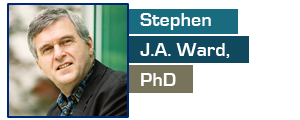How can journalists in a global world, marked by deep inequalities and cultural differences, help people understand others quite unlike themselves? One idea is that journalists follow an “open ethics” that stresses forms of “listening”, especially listening to those who lack powerful media voices. This is the thesis of an article published today in Journalism Studies, by Herman Wasserman of the University of Cape Town and myself. We argue that listening, if understood correctly, is a promising concept and method for a media ethics that seeks to cross borders and reduce ethnic and other forms of conflict. To some extent it is the negative injunction to “minimize harm” gone global, but it is more than that. It is the positive injunction to not only give people the freedom to speak, but to recognize their right to be heard — meaningfully heard. Listening is not a polite tea-time conversation. It is an emerging method for difficult discussion in a polarized and fragmented world. Available at: http://www.tandfonline.com/eprint/PzYdfdyj7PepHzF6gnZC/full#.VA3s5fldWSo


